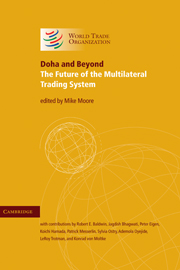Book contents
- Frontmatter
- Contents
- List of contributors
- Introduction
- 1 Trade and sustainable development in the Doha Round
- 2 The WTO: the institutional contradictions
- 3 China's entry into the WTO and its impact on the global economic system
- 4 Key challenges facing the WTO
- 5 Development dimensions in multilateral trade negotiations
- 6 External transparency: the policy process at the national level of the two-level game
- 7 Trading for development: how to assist poor countries
- 8 Controlling corruption: a key to development-oriented trade
- 9 The impact of EC enlargement on the WTO
- Index
- References
5 - Development dimensions in multilateral trade negotiations
Published online by Cambridge University Press: 05 August 2012
- Frontmatter
- Contents
- List of contributors
- Introduction
- 1 Trade and sustainable development in the Doha Round
- 2 The WTO: the institutional contradictions
- 3 China's entry into the WTO and its impact on the global economic system
- 4 Key challenges facing the WTO
- 5 Development dimensions in multilateral trade negotiations
- 6 External transparency: the policy process at the national level of the two-level game
- 7 Trading for development: how to assist poor countries
- 8 Controlling corruption: a key to development-oriented trade
- 9 The impact of EC enlargement on the WTO
- Index
- References
Summary
Introduction
This chapter sets itself a fairly straightforward set of tasks – i.e. to identify the key development dimensions of multilateral trade negotiations, discuss how they have (or have not) been embedded in the framework of previous negotiations and suggest why and how they could be more effectively integrated into future negotiations. To start with, however, it may be useful to ask a related question: why is there a current concern with integrating development dimensions into the framework of multilateral trade negotiations?
This concern appears to be fuelled by several considerations. One of these reflects institutional ambition. The World Trade Organization (WTO), which is the primary institutional organ of the multilateral trading system, has sought greater inclusiveness and the globalization of its coverage, in terms of membership, as well as the widening of its mandate over an ever-increasing range of trade and trade-related issues. In seeking global membership and a comprehensive mandate, the system makes an implicit commitment that all member countries stand to benefit from the system's market access and rule-making agenda. Yet, in reality, wide gaps continue to exist among developed, developing and least-developed member countries of the system. Hence, it is becoming increasingly crucial that efforts be made to address and ameliorate the marginalization of low-income countries and redress the marked differences in the distribution of the benefits of multilateral trade negotiations.
- Type
- Chapter
- Information
- Doha and BeyondThe Future of the Multilateral Trading System, pp. 68 - 93Publisher: Cambridge University PressPrint publication year: 2004

